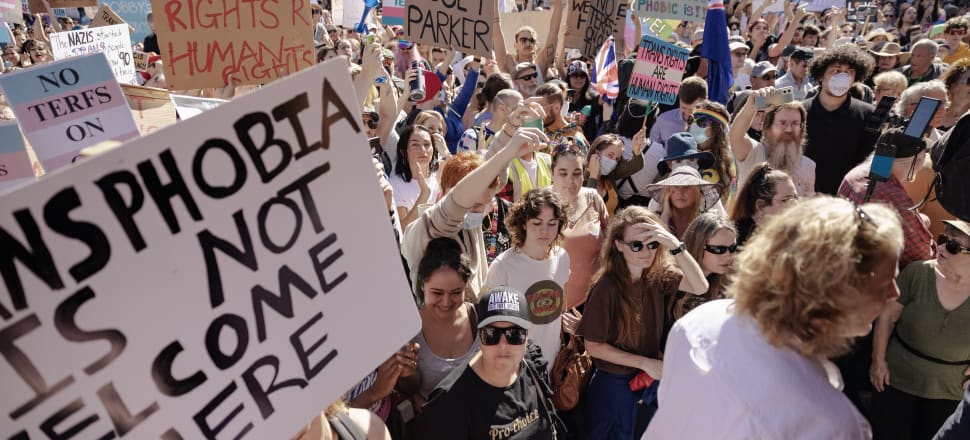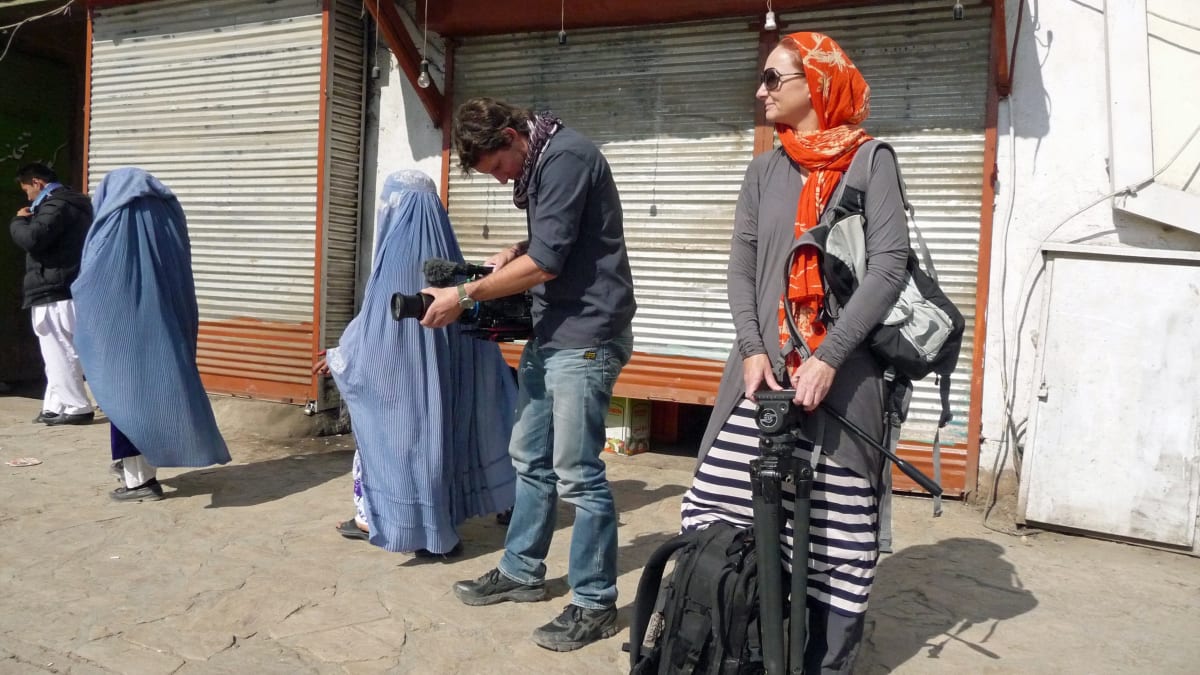
Story sovereignty means telling a story on your own terms, without outside influence. The concept has gained momentum in the Māori and Pasifika worlds, as writers and filmmakers look to step outside the realm of Pākehā publishers. The LGBTQI+ community, and others, are also embracing it.
The Detail's recent podcast on the fallout from anti-trans activist Posie Parker's brief visit got the expected vitriol and nasty personal attacks that come with controversial topics these days.
But a message from Becki Moss was different. She says she was the only photojournalist from the LGBTQI+ community at the rally taking photos, but none were published.
"My partner, flatmates and other trans members of my community have been concerned with who is telling our stories."
So today, The Detail looks at story sovereignty from three different angles.
Becki Moss non-binary, queer photojournalist
Moss is a member of the international Women Photograph database, as well as a regular contributor to NZ Geographic and Stuff. She was Young Photographer of the Year in 2020, and as an active member of the LGBTQIA+ community, she recently produced and hosted Auckland Pride's first event for and by disabled members of the rainbow community.
She was on the rotunda at the Posie Parker rally, along with other photographers. She offered her photos for publication to mainstream media, but the only photos that were published, she says, were taken by cis men.
She says the coverage of the rally in mainstream media raises questions "about whose lens we document history".
"There was definitely a lacking presence of diversity of who was actually capturing that moment."

Her photos of the rally differ to those of other professional photographers because they show fewer faces, Moss says.
"I've seen my friends get death threats and if people are wearing a mask and are looking away from the camera why do I need to capture their face to make a point?"
She chose not to identify protesters she knew could be exposed to further "hatred and vitriol".

Moss explains why she believes editors need to think beyond the usual team of photojournalists.
"I think it's important to take chances, trusting people to photograph their communities means that you have a lot more inside knowledge, you also have a lot more trust from the people in that community.
"Trust is a big part of capturing images of people who are more vulnerable."
Geoffery Matautia South Auckland photographer
Matautia works in AUT's Office of Pacific Advancement, where he supports Pasifika students. His front yard series of photos taken during lockdown in 2021 were published on Stuff and in NZ Geographic.
He says the negative news stories about South Auckland at the time inspired him to "flip it" and take photos of people in their front yards, imagining summer out of lockdown.
Matautia describes the "deficit perspective" of stories from his community that run in mainstream media.
"It means there's some wrong in the story, there's some problem, especially when you talk about poverty, a lot of social issues to do with my community. A lot of what's missing is the celebratory things."
Matautia says photojournalists are often hired to "pop in and pop out" of a community, like a spectator at the zoo, without telling the people they've photographed how their images will be used.
He says he learned from taking photos during the Rugby League World Cup that it took little effort to introduce himself to the subjects, ask them if he could take their photo, and tell them where they could access the image.
"When I'm shooting community events, the ownership never sits with me, especially if I'm not commissioned by a big entity or organisation."
He tells The Detail why his view on story sovereignty may not fit with others in his community.
"I 100 percent believe in Pacific people telling Pacific stories, but there are barriers in terms of access to resources and access to money. I think there should be an openness on both parts."
Pietra Brettkelly documentary maker
Brettkelly has travelled to far-flung parts of the world to tell other people's stories, including Afghanistan, Sudan and China.
She is often told that she shouldn't be telling the stories, but she is determined to continue making her films, albeit differently.
The challenges started, she says, with the 2011 film Maori Boy Genius, the story of teenage prodigy Ngaa Rauuira Pumanawawhiti.
"Actually I'm quite whakamā, and I don't mean shy, I mean ashamed of how I made that film."
She says she would make the film differently now, by working alongside or mentoring Māori filmmakers.

"This extraction of stories, it really is modern colonisation. I'm a white person from a privileged first world country and I'm going and I'm extracting stories - and to what benefit for the people that are the subjects of my film?"
Brettkelly is exploring story sovereignty through a 2023 Winston Churchill Memorial Trust Fellowship.
She explains how she tried to address the "white saviour complex" with her latest film Crocodile, set in Nigeria, and how she has a legal contract with the subjects of the film that make them co-owners.
"I think I'm safer, I think the film is safer and I know they feel such strength and power."
Hear more from Becki Moss, Geoffery Matautia and Pietra Brettkelly in the full podcast episode.
You can find out how to listen to and follow The Detail here.
You can also stay up-to-date by liking us on Facebook or following us on Twitter.








